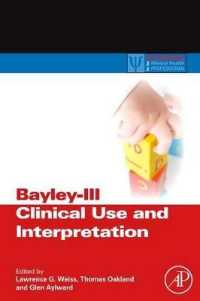- ホーム
- > 洋書
- > 英文書
- > Politics / International Relations
Full Description
This book will be available open access upon publication.
Capital, Privilege, and Political Participation examines how privilege and people's perceptions of it relate to their involvement in politics. It treats people's stocks of economic, social and cultural capital as indicators of privilege as well as resources that help them engage with politics. It also argues that how people perceive privilege in society, their own lives and politics matters for their political participation. Using survey, interview and focus group evidence, the book shows that capital and perceptions of privilege do, indeed, relate to involvement in a host of political activities. Whilst political participation is a normal if not daily feature of many people's lives, having more economic and cultural capital is associated with being more politically active. Perceiving the role of privilege in society is also linked to higher levels of participation, whilst perceiving privilege in politics is unsurprisingly associated with being less politically active. Questions abound about how, if at all, capital and perceptions of privilege are causally related to political participation, but the book concludes that getting involved in politics is a distinguished activity. Efforts to tackle these inequalities in participation should, according to the people who participated in the research, centre on outreach activities by political institutions, more extensive and consistent citizenship education, and the active opening up of politics to the population.
Contents
List of Figures List of Tables Acknowledgements
Introduction Political Participation Privilege, and Capital Considering the Context Overview of the Book
Unequal Political Participation Commonplace for Some What is Political Participation? What Drives Participation? Unpacking Who Participates Towards Structural and Perceived Privilege
Structural Privilege Inequality and Privilege Capital and Politics Capital, Class and Privilege
Perceptions of Privilege The Importance of Perceptions Perceptions, Inequality and Politics Perceptions of Groups and Status Status, Explanations and Political Participation Accounting for Perceptions of Privilege
Political Participation and Non-Participation Diversity in participation and Non-Participation A Note on How the Research was Conducted Supporting Organisations Undertaking Political Acts Barriers to Participation
Economic, Social and Cultural Capital The Many forms of Capital Economic Capital Social Capital Cultural Capital The Importance of Capital
Perceptions of Society, Self and Politics Perceiving Privilege in Different Contexts Perceptions of Privilege in Society Perceptions of Own Privilege Perceptions of Privilege in Politics Four Components of Perceptions of Privilege
Politics as a Distinguished Activity The Many Factors in Political Participation Economic Capital and Political Participation Social Capital and Political Participation Cultural Capital and Political Participation Perceptions and Political Participation Politics as a Distinguished Activity
Is Participation a Consequence or a Component of Privilege? A Causal Conundrum The Mediating Role of Capital? The Mediating Role of Perceptions of Privilege? Politically Relevant Capital A Conundrum Unanswered
Conclusion and Solutions Capital, Perceptions of Privilege and Political Participation The Relationship between Privilege and Participation Overcoming Barriers to Participation
Appendices A: Privilege and Participation Survey Representativeness B: Interview and Focus Group Details C: Index Variable Distributions D: Regression Results
Bibliography Index








